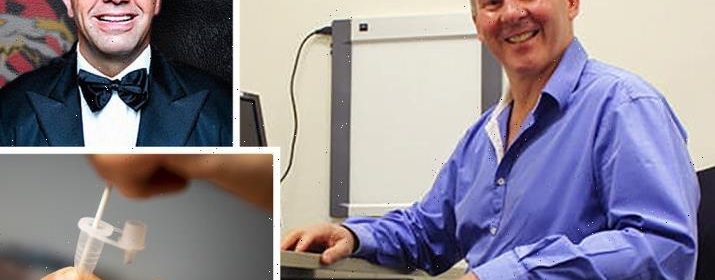Doctor left with $1m bill after RAT import deal with bikie boss sours

A Malvern doctor is facing significant financial losses after agreeing to import thousands of rapid antigen tests on behalf of former bikie boss and convicted heroin trafficker Amad “Jay” Malkoun and several associates.
The $1 million deal between Dr Peter Lewis and a syndicate organised by Malkoun recently soured, and the former Victorian president of the Comancheros gang and his business partners refused to pay for the consignment from China.
Dr Peter Lewis, the doctor who presides over most boxing matches in Victoria and who struck the $1 million deal to import RAT tests.
The business partnership was placed under further strain when an associate of Malkoun demanded the return of a deposit and recently issued Lewis with a warning, according to two sources familiar with the deal, but who asked not to be identified because of concerns for their safety.
“He [Lewis] has some big problems. One of Malkoun’s mates, who also has a criminal history, wants the money [deposit] back, and he won’t be taking no for an answer,” one source told The Age.
Lewis has been a medical practitioner for almost 40 years and is an expert in the field of sports medicine, according to his company website.
Chairman of the Australian Ringside Medical Association and holder of a fourth-dan black belt in karate, Lewis is also the presiding doctor at most boxing and kickboxing events in Victoria.
He declined to comment when contacted by The Age and did not respond to questions.
Former Comancheros boss Amad ‘Jay’ Malkoun.
The Age does not suggest any illegal conduct by Lewis, who has provided specialist medical treatment to Malkoun since he returned to Australia in 2020 after sustaining extensive leg injuries in a car bombing in Greece.
It is unknown who Malkoun’s syndicate intended to sell the rapid antigen tests to, but their involvement in the medical supply industry is expected to raise concerns for health regulators and law enforcement agencies.
The 59-year-old has maintained a low profile in Melbourne since the attempt on his life outside a gym in the upmarket Athens suburb of Glyfada in 2019.
The site in Athens where Amad Malkoun’s car exploded.Credit:Nick Miller
Greek police, working with Interpol and Australian law enforcement agencies, previously confirmed they were examining Malkoun’s feud with elements within the Comancheros as a possible motive for the bombing.
Sentenced to a decade in prison in 1988 over his role in trafficking $5.5 million worth of heroin between Melbourne and Perth, Malkoun has an extensive criminal network across Asia and Europe, including Russia, where he established a Comancheros chapter.
His agreement with Lewis to import rapid antigen tests from China was made earlier in the year, when the rapid antigen test kits were scarce and Omicron case numbers were surging across the nation.
In January, Lewis told The Age that he had established a thriving side business selling the kits to patients and colleagues in the medical profession.
“Supply simply can’t keep up with demand, and only now have governments around the country decided to boost our stocks,” he said on January 1.
However, Lewis is now burdened with a massive oversupply of the kits and has been in recent discussions with other medical suppliers, some with contacts to the Andrews government, to offload the stock.
Lewis was embroiled in controversy last year when his medical company Sure Cell, which has clinics across Melbourne, was found to be offering the anti-parasite drug Ivermectin to treat COVID-19, despite widespread concerns about its efficacy.
The medical group’s website was offering the drug at $85 per pill in September last year, which attracted an immediate rebuke from some colleagues of Lewis.
“We strongly encourage people not to use any of this drug,” said Dr Karen Price from the Royal Australian College of General Practitioners.
“This is not a trustworthy medication used in this way,” she said.
At the time, Lewis defended the decision to provide the controversial drug.
“Ivermectin is not an alternative to vaccines,” he said.
“It’s an early intervention strategy for those who are vaccinated or not.”
The Morning Edition newsletter is our guide to the day’s most important and interesting stories, analysis and insights. Sign up here.
Most Viewed in National
From our partners
Source: Read Full Article



